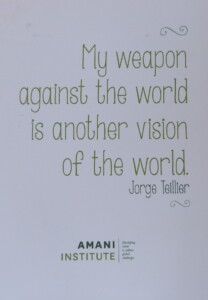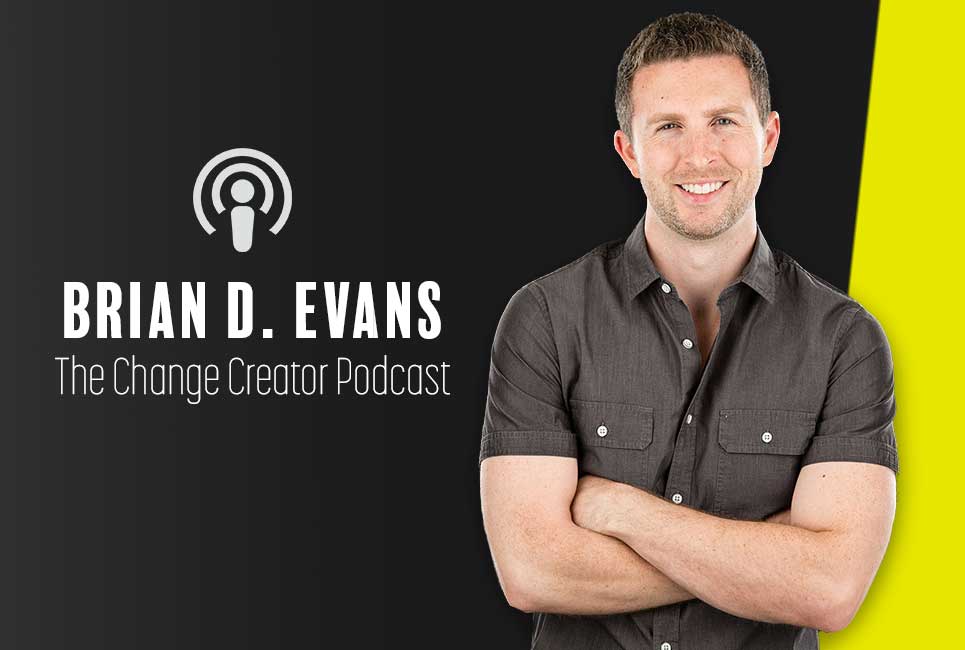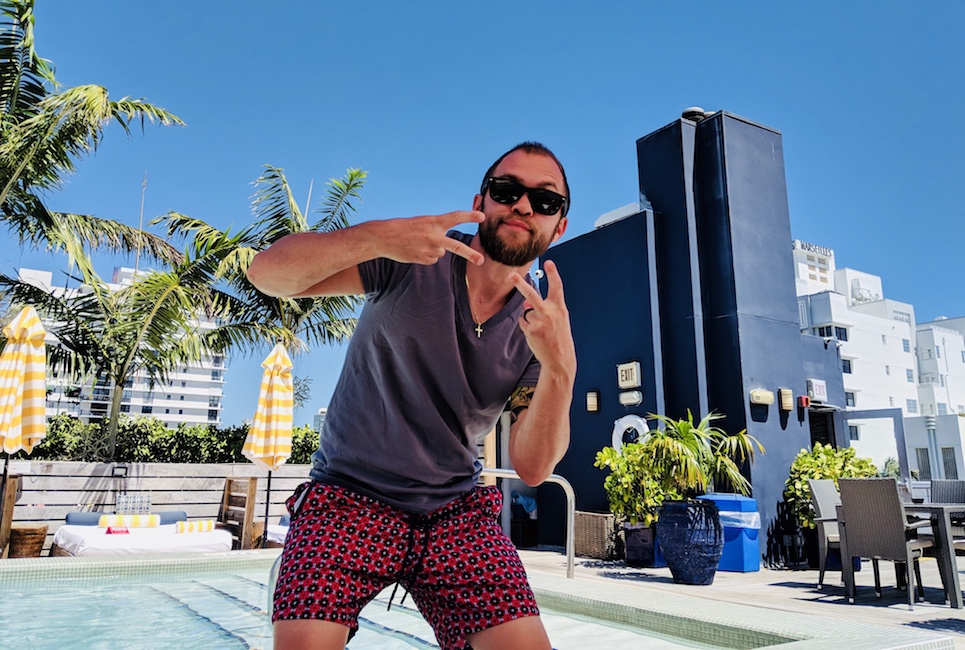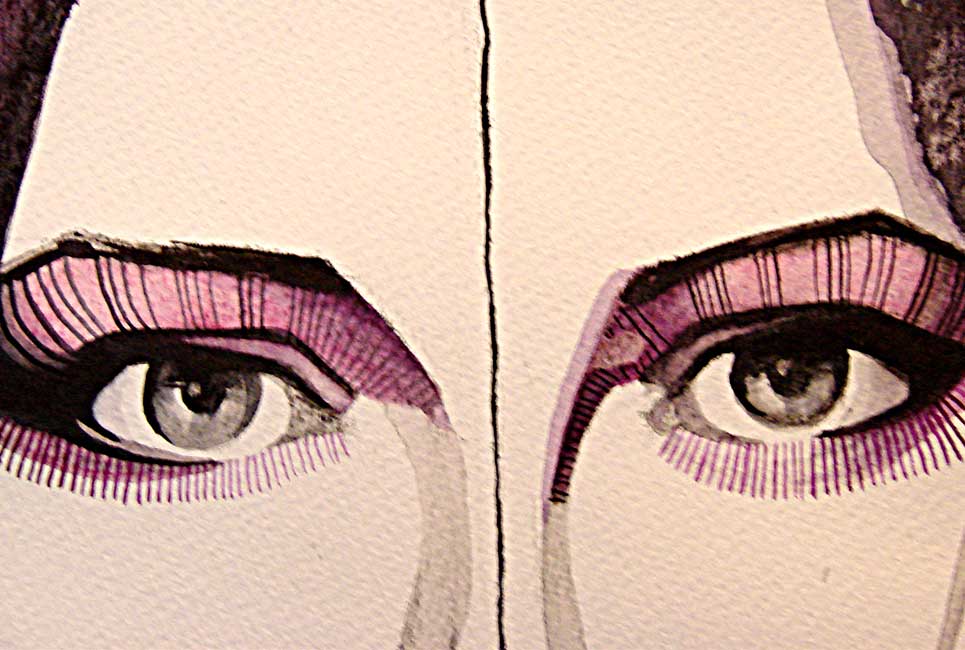A deep dive about the conditions today that are inspiring the recent transition towards social entrepreneurship and how it will impact employers.
Continue readingWhat it Takes to Build a Globally Recognized Media Platform
Inc 500 Entrepreneur and founder of Influencive.com, Brian D. Evans, shares his powerful strategies for building a personal brand and scaling up your blog or media platform.
Continue readingAdam G. Force Talks Shop with Joel Brown about Building an Impact Business
Exclusive interview with Change Creator Founder, Adam G. Force.
He’s interviewed many of the world’s best such as Grant Cardone and Tony Robbins and is doing amazing work today.
We discuss what it takes to build a world-class brand that drives real impact in the world.
I interviewed Joel in 2016 and he was on the cover Change Creator Magazine issue 3.
In this interview Joel and I dive into a range of topics, including:
- What is the current shift taking place in mindset today?
- Why Change Creator was created?
- What is the difference between social entrepreneurship and economic entrepreneurship?
- What was a big takeaway from my interview with Arianna Huffington?
- What was my biggest breakthrough or lesson in putting the magazine together?
- What are 2 key paths to marketing essential to understand?
- How I connected with major influencers like Arianna and Tony and what took to succeed.
- How to select the right influencers.
- Advice to running a side-hustle and when you can leave your job to go full time.
- Why you have to be willing to invest in yourself and business.
- What it means to stack success and how I did that with the magazine.
- Why travel is so important to empower yourself.
- What does it take to find your mission?
- What is self-inventory?
I hope you find this helpful and inspiring!
“The world is whatever we decide it to be and we need to look at ourselves first and foremost to change anything around us”.
Creating Change from the Inside Out as a Social Entrepreneur
“When it comes to action” he said, “you have to think about building a team, partnerships, testing your idea, developing your business, a business model, raising funds, creating an advisory board and a board of directors or scaling your work…” James gets nods of agreement from the rest of the Fellows, some offered additional points to consider.
All of them had shared ideas of what is needed at each point of the framework underlying the course we call the ‘Inner Journey of the Changemaker’ at Amani Institute. I took a deep breath. This was my fourth year facilitating the course and each time this is the moment when I get excited because this is where things get real.
It’s not difficult to think of the elements needed to start, build and grow a social enterprise. What we usually come to think of way later, when we are in the midst of what they call ‘baptism by fire,’ is how we as a person affect the outcomes of all the above. To a large extent, our work stands and falls with ourselves.
 Building a team – how do you choose the right people? How do the ways you have come to learn to communicate, resolve conflicts and navigate people’s strengths, and weaknesses affect the outcomes of your work? How does your weak follow-up game affect your partnerships? Or are you too eager? How does your fear that they might not like your work, or worse, yourself, affect your communication and strategy with them? What about your relationship to hearing ‘No’ and general rejection?
Building a team – how do you choose the right people? How do the ways you have come to learn to communicate, resolve conflicts and navigate people’s strengths, and weaknesses affect the outcomes of your work? How does your weak follow-up game affect your partnerships? Or are you too eager? How does your fear that they might not like your work, or worse, yourself, affect your communication and strategy with them? What about your relationship to hearing ‘No’ and general rejection?
How does your fear that your idea may not be that good affect your prototyping? Or maybe you don’t have fears but are overtly confident and don’t know it, but you are a terrible listener, and your design thinking prototype sucked and just served to check a box but didn’t provide you actual information to co-create a solution to the problem you want to address?
What about developing the business? Are you prioritizing things right? Wait, did you already burn out? Do you know how to sustain your health, relationships, and family while pursuing that dream of change?
What about your relationship with money? Do you know how to understand potential funders and how your story connects with their desires? Did you learn how to pitch but you still find 1001 reasons to procrastinate building the pipeline? Do you over-promise? Do you sleep at night?
Do you have the courage to ask the right people to join your advisory board or board of directors? Do you know when is the right moment to ask them? Are you self-deprecating or too pushy? Do you know how to listen?
“The quality of your work, no matter as an entrepreneur or as an intrapreneur, depends on how you can navigate yourself and grow into who you truly want to become.”
Do you know yourself? Do you know that changing the world requires changing yourself?
Looking at James and the 18 other Fellows from 10 different countries and incredibly diverse backgrounds, I said: ‘Welcome to the Inner Journey of the Changemaker. In this course, we will explore what it takes to unlock your potential and sustain your work in the long run. To every external aspect of our work is an inner aspect that is determined by our story and who we have become. The quality of your work, no matter as an entrepreneur or as an intrapreneur, depends on how you can navigate yourself and grow into who you truly want to become.’
It blows my mind that we still don’t have curricula in mainstream education – from Kindergarten to University – that take advantage of the vast knowledge out there on how to unlock our potential, become more resilient and flexible in how we communicate and resolve conflicts, instead of depending on replicating our families’ and communities’ patterns. There is a reason we have a multi-billion dollar coaching – and therapy – industry.
In this ongoing column, I will share insights we have gathered at Amani Institute teaching ‘the Inner Journey of the Changemaker’ which is an integral part of our Postgraduate Certificate in Social Innovation Management aimed at helping people to build careers of meaning and impact.
Next, I will explore the issue of passion and purpose and how understanding your true north can set the direction and impact of the change you want to create.
Put yourself out there and do work that creates value for people and the planet with the skills you already have: This is an instant recipe for meaning.
Moment of Obligation
“I do this because when I got raped and when I got my diagnosis, I wished there was a safe space where people had shared their narratives that I could tap into and get the strength to move forward.” Sitawa Wafula, Amani Institute alumni and New Voices Fellow at Aspen Institute, shares her personal story as a rape survivor and mental health diagnosis as part of her work championing Mental Health in Africa and beyond through ‘My Mind My Funk’ – a information and support hub located in Kenya.
In her story, she didn’t really see any other option but create a solution for something she needed – her life’s purpose revealed itself in her greatest struggle.
Stories like this carry immense power in their vulnerability and in how they show how the medicine you create for your wounds sometimes can become your biggest gift to the world. However – not all Changemakers have such stories or are aware of the power of their own.
In a world of which we speak a lot about passion, more and more people are asking how they can connect this to purpose. A reason to get out of your bed every morning that is larger than yourself.
I work with people who are looking to switch their career from the private to the social change sector as well as professionals who have hit a wall in their work as a social entrepreneur or NGO employee or students who know that they ‘want to change the world’ but are not sure yet really how.
There are two reasons why better understanding your underlying motifs and the values that guide them is relevant for you as a Changemaker:
- There are many, many, many challenges – and tackling them is incredibly challenging. So, first of all, if you get lost in the jungle of options, it helps to know what is most important to you to make decisions.
- And secondly, of you get tired and lose all hope it helps to remember why you are doing this to refuel and recover.
So you need both – a guiding star and an anchor. You need your vision and your why. In his book “Sharing Wisdom From Over 125 Outstanding Leaders”, acclaimed former Medtronic CEO Bill George calls this the ‘True North.’
One thing we can learn from people who have a track record in sustaining a career in creating social change is that they are deeply aligned with their ‘why.’
One of our instructors, Jerry White, who is known for leading high-impact campaigns including the historic International Campaign to Ban Landmines that won a Peace Nobel Prize in 1997, points out that most social entrepreneurs are very clear about what they want to do and how they are going to do it but not why.
Why you do it is an inquiry into who you are, something that in philosophy and wisdom scriptures all over the world is at the core of transformational leadership narratives. He claims that if we use technical solutions in a knowledge-based approach, we often create more damage than good and miss a wiser approach that arises when we are aligned with our ‘True North.’
Watch him speak about this in detail in this video taken during an Ashoka Fellowship Program:
Not every story is as seemingly clear-cut as Sitawa’s. Some people have a single transformative moment; others have a feeling it has always been in their cards to do what they do, and others have more of a slow burning that reveals itself over time in the conviction that a fulfilling life includes answering the question what the world needs from them.
For those who are desperately looking to find a name for their purpose, I strongly recommend to taking the pressure off the Quest. As Dr. Vincent Ogutu, Vice Dean Executive Talent Development at Kenya’s Strathmore Business School shared with our Fellows at Amani Institute: Put yourself out there and do work that creates value for people and the planet with the skills you already have: This is an instant recipe for meaning. You may stumble over your deeper ‘why’ in the process, as he did when doing an impromptu speaking engagement in a prison – but you don’t need to have it to start doing meaningful work.
Ways of inquiring your moment(s) of obligation include identifying your values and vision through biographic work or looking into what we call the ‘wound-gift’ concept. You can do it by yourself or with a mentor or coach. In any case it is a process of inquiry that needs your engagement with the world to fully reveal itself – reflection alone doesn’t cut it.
This article was originally published in two part for issue 4 and 5 of Change Creator magazine by Geraldine Hepp of the Amani Institute.
Secrets to Building an Audience For Your Social Enterprise
Yanik Silver shares his secrets to sales, marketing and mission. What does it take to succeed with your startup and drive impact?
Continue readingHow Millennial Women Are Securing a Path To Discovery and Solidity
Millennial women are a rising force to be reckon with. In this article we explore why that is and their culture so you understand what this $18 trillion dollar market of girl power is about.
Continue readingInfographic: 5 Priceless Lessons For Success in Life & Business
It was truly an honor to have the opportunity to interview Tony Robbins and have him on the front cover of issue #8. His story is moving and his experience is absolutely priceless.
Continue readingWhy You Aren’t Growing Your Business and What To Do About It
Mike Paton is the author of the book, Get a Grip, where he talk about how leaders learned to develop and commit to a clear vision, establish focus, build discipline, and create a healthier and more cohesive team.
Continue readingWomen Leading Social Change: 5 of the World’s Best Female Social Entrepreneurs
This has been recognized by many of the world’s leading thinkers and doers including the Dalai Lama, who said:
“According to scientists, women have more sensitivity than men. Sometimes I really feel that more women should take responsibility in the leadership of our planet. It would mean less violence.”
Beyond the numbers, beyond UN statistics, there are thousands of leading female social innovators who are reinventing how to address pressing issues and effecting change on a regional and global scale.
Having women social entrepreneurs is good for any number of reasons (for the most cut and dried, go back to those UN statistics). But one reason that’s often left out is that women, especially at the grassroots level, have the perspectives and ingenuity to effect change benefiting other women and society more broadly in a very efficient way.
It’s women, for instance, who often understand the barriers to accessing the resources for change. It’s women who understand that programs after working hours often don’t work for women because, in most traditional countries, they’re expected to care for children or cook. Women, more than men, better understand the challenges their children face when it comes to accessing education, finding employment, and getting health care. These are the perspectives that women bring to social innovation that make their participation so significant.
With this in mind, here are five of the world’s leading female social entrepreneurs. They’re spread out all over the globe, with women working in diverse areas with diverse people. Some of them you may have heard of, others probably not.
Remember, if one organization speaks to you, don’t hesitate to reach out and get involved. These organizations are often hiring and are always taking volunteers. Don’t be afraid to venture out and get involved, even if the organization is far away from your home.
ONE
- Organization: Afghan Institute of Learning
- Social Entrepreneur: Sakena Yacoobi
- Focus Area: Early Childhood to Primary Education, Women’s and Girls’ Education
- Regional Focus: Central and Southern Asia
- Major Awards: Skoll Award, Ashoka Fellowship, Opus Prize, Schwab Social Entrepreneur
- Website: http://www.afghaninstituteoflearning.org
What they do:
Over the last twenty years, the rights of women, access to education, and the availability of healthcare and health information have floundered in Afghanistan. Simply attending school or getting a book was almost impossible under Taliban rule, especially for women. Today, the Afghan Institute of Learning (AIL) is working to rebuild an education system across the country by training teachers (21k to date), health staff (10k to date), and operating a hospital which sees 2000 patients per month.
Why it’s important:
AIL is spreading education and health information across a country that, after nearly three decades of war, has a vacuum. The teachers AIL trains, the nurses they inform, and most importantly, the boys and girls they teach will go forth in their country with the skills and knowledge to rebuild Afghanistan and bring prosperity to the country.
TWO
- Organization: Breakthrough
- Social Entrepreneur: Mallika Dutt
- Focus Area: Human Rights
- Regional Focus: Central and Southern Asia, North America
- Major Awards: Lipman Family Prize, Skoll Award
- Website: http://us.breakthrough.tv
What they do:
With its mission of making violence against women and girls unacceptable, Breakthrough uses media arts, and technology to change norms. Through classroom modules, leadership development, educational entertainment such as interactive theater, video vans, call-in radio shows, online games, and mass media public service advertising, Breakthrough is training people from all backgrounds and changing societal norms to make the world less violent toward women.
Why it’s important:
Breakthrough is truly reaching a large audience in India and the US. Since their founding, their campaigns have reached millions of viewers and over 500,000 people have participated in their training sessions. What’s more, their work with lowering the prevalence of child marriage has resulted in an increase of nearly a year in the marriage age for girls in villages where the program operates.
How to Use Pop Culture to Tackle Human Rights Issues
Change Creator exclusive interview with Malika Dutt
Mallika Dutt & Sonali Khan of Breakthrough Accept the 2016 Skoll Award
THREE
- Organization: 96 NISAA FM
- Social Entrepreneur: Maysoun Odeh Gangat
- Focus Area: Civic Engagement
- Regional Focus: Palestinian Territory, greater Middle East
- Major Awards: Ashoka Fellowship, Synergos Fellowship, CGI Fellowship, Schwab Fellowship
- Website: http://www.radionisaa.net/
What they do:
96 NISAA FM is the first commercial, Arabic language, women-focused radio station and website in the Levant. 96 NISAA FM, meaning women, uses the airwaves to empower women through the use of media and through providing a platform for everyone to come and discuss women’s issues.
Why it’s important:
96 NISAA FM uses a unique and new approach to addressing women’s issues in the Arab World. Through media, it transforms how women see themselves and how they are perceived and seen in regional and global media outlets. 96 NISAA FM is also used to present women with positive role models, give them information on professional growth and development, and encourage more of them to enter the global media stage.
FOUR
- Organization: Roots of Peace
- Social Entrepreneur: Heidi Kuhn
- Focus Area: Peace, Human Rights
- Regional Focus: Central, Southern, and Southeast Asia; Europe; Middle East; Africa
- Major Awards: Rotary International “Service Above Self” Award, “Walk the Talk” Award from UN World Environment Day, Skoll Award
- Website: http://www.rootsofpeace.org
What they do:
Roots of Peace aims to revitalize war-torn parts of the world. They do this in several ways from the most fundamental, like removing landmines, to the more nuanced, like restoring farmlands so that people can work and earn a living.
Why it’s important:
Roots of Peace (ROP) works all over the world removing landmines and other remnants of war so that land can be cultivated again and people can go back to productive work. From 2004 – 2014 alone, ROP helped to put one million farmers back to work and created tens of thousands of jobs in Europe, the Middle East, Africa, and Asia.
FIVE
- Organization: Saúde Criança
- Social Entrepreneur:Vera Cordeiro
- Focus Area: Economic Opportunity, Education, Health
- Regional Focus: South America
- Major Awards: Ashoka Changemakers: Innovations for Health, Top 500 NGOs, Skoll Award
- Website: http://www.saudecrianca.org.br/en
What they do:
Saúde Criança is an organization that, with its pioneering methodology, helps children who require hospital care and live below the poverty line and pushes families toward economic and social self-sufficiency. Among other things, Saúde Criança offers vocational training to families, provides housing and housing improvement, and runs programs for pregnant women and adolescents.
Why it’s important:
Saúde Criança uses a groundbreaking approach to social change which has been studied and shown to work by studies at Georgetown University. Because of its success, the methodology has been replicated at 23 institutions in 6 Brazilian states, which has helped more than 50 thousand people across the country. The methodology has even been incorporated in several hospitals in Rio de Janeiro and Belo Horizonte.
Reinvent Yourself: Experience Life Like Never Before [Free Download]
If you’re ready for a higher quality of life, download “Reinvent Yourself” to explore expert insights that show you exactly what it takes to get there.
Continue readingUsing Innovative Gaming to Protect Wildlife
For many years now wildlife has been under attack and extinction rates are higher than ever before. Today, social entrepreneurs like Gautam Shah and Anne Miltenburg are using innovation to help push conservation of these important creatures.
Continue readingA Look at Climate Change and the Role of Social Entrepreneurs
The topic of climate change isn’t always easy to discuss, but the subject has become unavoidable. Sea levels have continued to rise annually by 0.14 inches since 1992. Glaciers and ice caps are melting at an alarming rate.
Continue reading












